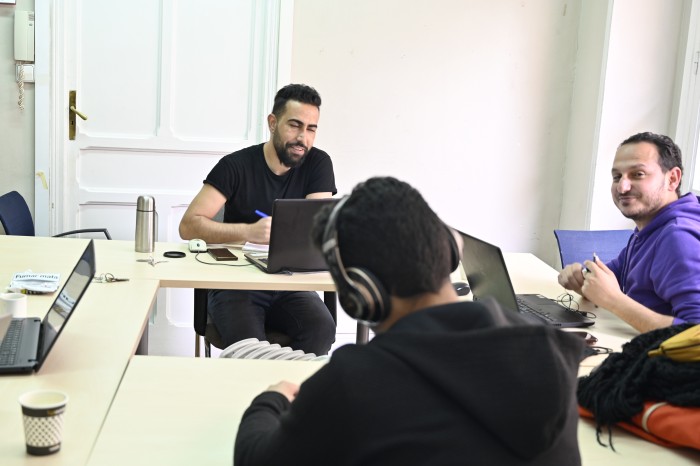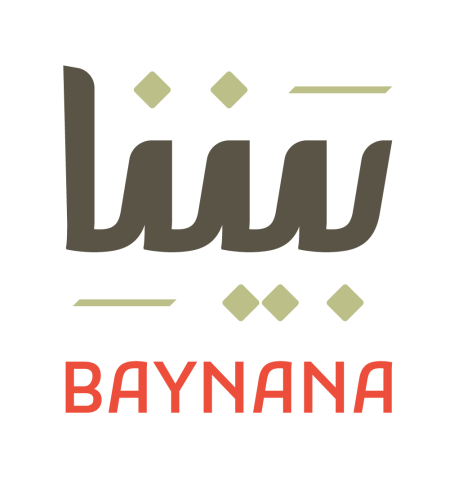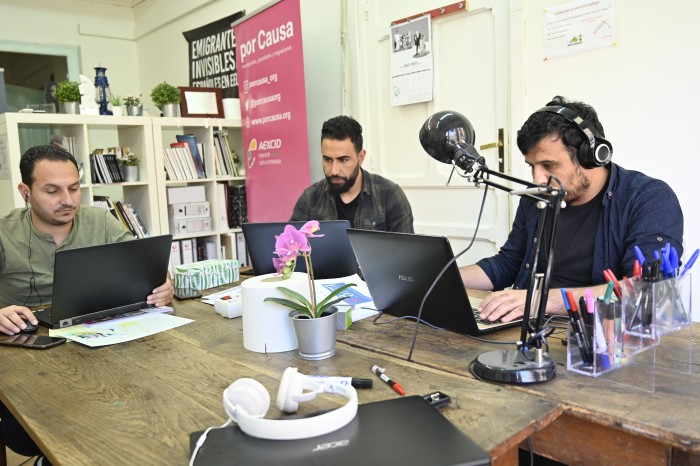WE NEED YOU TO DO JOURNALISM THAT INTEGRATES, NOT DIVIDES. FUND #MIGRANTJOURNALISM
Human beings have been in transit for as long as we have existed, whether out of economic necessity or pure survival: migration is part of the history of humanity, and has always been a driving force for change and social progress. However, more recently, something so basic seems to have been forgotten: we are living in dark times where fear of the other is spreading, the 'us' against 'them' is becoming more and more prevalent and too many media outlets reproduce and reinforce this conflict in our societies.
A year and a half ago, we, a group of Syrian journalists, arrived in Spain after leaving behind our country, immersed in a seemingly endless war. We found a supportive place with people who welcomed us, but we also experienced the hate speech against those who, like us, were born elsewhere or have a different skin tone.
So, we said to ourselves that it was necessary to have a medium in which we could all feel represented. It is in this spirit that Baynana was born, a digital magazine in Arabic and Spanish that talks about the social issues faced by migrants and refugees. A medium that shows their role in Spanish society, in which they live, of which they are part of, to which they contribute and which they enrich with their culture, their work, their history, their traditions…
We want to make their struggles and dreams, which are no different from the rest, visible: highlighting what unites us as human beings instead of what separates us. Baynana means "Among us" and embraces us all: 'we' are 'all', there is no 'others' or 'them'.
We believe that, despite what we are told, Spain is a diverse and tolerant society, that welcomes those who come from somewhere else with open arms. We want to represent ALL the people who live here, people who connect and interact, people who come with nothing and manage to improve their lives (and the lives of many others). Talking about the small, everyday victories of the invisible. Although it is not very common these days, we want to talk about friendship, tolerance, coexistence and love.
This project has been built with few material resources and tons of excitement, but to keep it alive we need funding. The four people who make up Baynana's permanent staff need proper and decent working conditions. We need the right materials and equipment that allow us to create the best visual content. If we want to be truly inclusive, we also need to expand our team to people of other perspectives, backgrounds and nationalities. We also want to tell stories that happen outside of Madrid, where we are currently based. To do all that, we need more resources. All proceeds the funds will go entirely to the project (that's also why we have chosen not to offer material rewards): we want to use every penny to do the journalism we believe in.
Will you help us to continue to exist?
Main features and goals of the crowdfunding campaign
What do we want to do?
- Make the daily reality of the refugee and migrant community visible, address issues of concern of these groups and talk about their experiences in the first person, from the multitude of voices that they represent.
- Offer useful and quality information to help navigate through the legal and bureaucratic systems of the host country.
- Fight the existing stereotypes and hate speech.
- Build bridges between the migrant and refugee community and Spanish society as a whole, to bring different parts of society closer together, emphasizing our common history and culture.
How do we want to do this?
Our magazine covers issues of politics, society, culture, history and human rights through reports, articles, interviews and videos, with a commitment to cautious and responsible journalism. At Baynana we also believe that journalism should be a tool for public service and social transformation, acting as an integrating element.
Thus, among the first topics we have covered at Baynana has been finding the story of migrants who were able to open a business in Spain and began to create jobs in their host country. Or that of the Moroccan women living in Cañada Real, who have become the driving force behind the protest for the rights of their community. Other reports tell the stories of the Arab influence on dishes that are considered the most typical and iconic of the Spanish cuisine, or the interview with Ashraf Karach, a Spanish-Moroccan influencer who fights racism and Islamophobia through social networks. Or the story of Malak Zunji, a Lebanese woman who started a project to employ refugees as chefs.
In addition, in our commitment to offering useful information to our readers, we have created a specific section (for now, only in Arabic) to answer foreigners' questions on bureaucratic and legal matters such as access to education and healthcare, work and residence permits, etc. We are now working on creating videos to complement these texts in order to facilitate the understanding and dissemination of this information.
We are also writing reports collaboratively with Spanish journalists to learn from each other and create different stories... and we have many more ideas... Can you help us put them into practice?
* Why us?
Today, the media's portrayal of migration is usually in terms of threat and danger. Fortunately, there are also a number of media outlets that are producing respectful and sensitive reports, trying to change the social perception of migration for the better... but we are still missing an insider's perspective. For example, since we arrived in Spain, many have been interested in our story, but too often they end up defining us exclusively by our status as refugees. That is a part of who we are, but we are much more than that. We don't like to be treated as victims, nor do we want others to become our spokesperson: we want to take the floor and tell our own stories. Do you want to listen to us?
We believe that it is more necessary than ever to build a medium in which migrants, children of migrants, refugees and racialized people feel reflected and acknowledged, and to speak to them in their own language. We believe we can tell these stories in a different way because we have been and still are in the shoes of all these people. We do not like to be talked about exclusively in terms of victims or executioners and we believe that we can explain complex realities with all their nuances, far from simplistic discourses. Help us change the narrative, fight intolerance and reflect stories that matter. Small and big. Spread the word about this campaign and collaborate. Fund #MigrantJournalism, fund #Baynana. Because this media is built 'Between Us' and by 'All of us'.
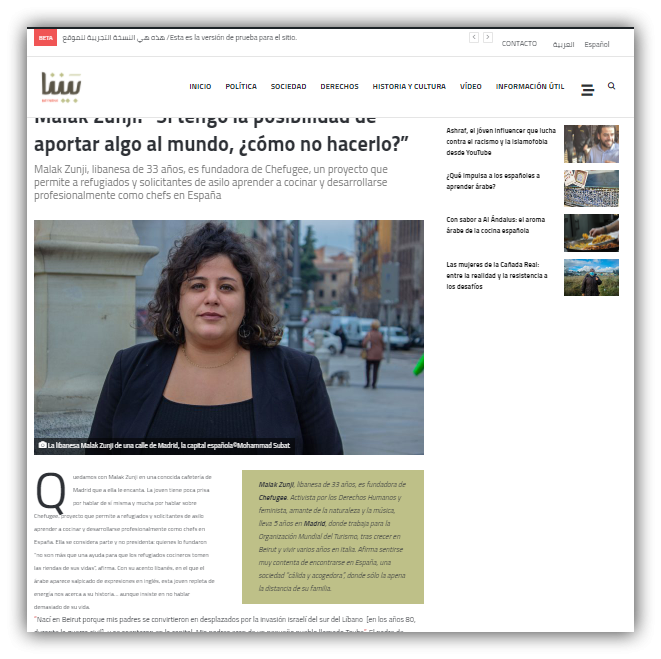
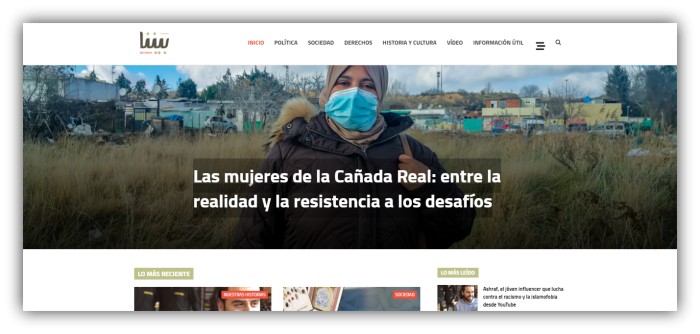
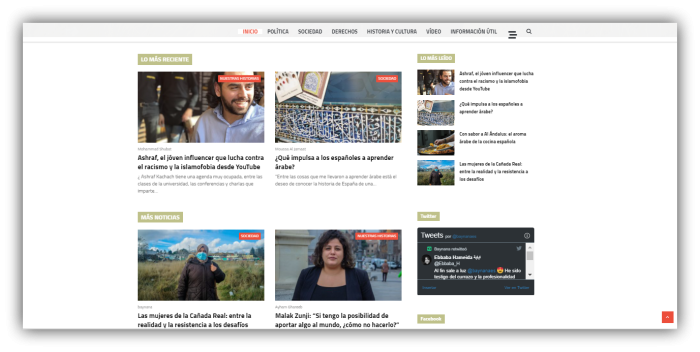
Why this is important
The support network that has welcomed us in Spain and helped us to get started has been incredible: thanks to donations and the contribution of many people who have given us their time generously and selflessly, we have been able to build our website and produce our first reports.
We are eager to do journalism and continue learning... but to be sustainable we need more resources. For example, we still need basic equipment, such as cameras or computers to edit our materials. We need professional translators to help us translate and adapt our pieces into Spanish. We also need a larger and more diverse team, which will allow us to tell what is happening outside Madrid and bring different perspectives to the project.
If you believe that it is necessary to create and promote news media where more diverse voices are heard; if you believe, as we do, that journalism should serve to offer useful tools, then support the first media created by and for the migrant and refugee community that actively advocates connecting among those who live in Spain and combat hate speech.
Can we count on you?
Team and experience
We are proud to say that Baynana is the first media in Spain designed and managed by refugees. Our team exists of four Syrian journalists and friends who arrived in Spain in 2019 after leaving Syria because of the war. Our project was born with the help of the porCausa Foundation, an organisation we met shortly after arriving in our new host country and whose members have become our second family. With their help, we have started to build this magazine, which we hope will soon be joined by more collaborators from other places thanks to you. For the time being, we are Baynana:
Ayham al-Ghareeb: he studied Arabic Literature at the University of Damascus. Since the beginning of the war in Syria, he has worked as a reporter and also in the education sector with various humanitarian organisations. He has been living in Spain since mid-2019, where he is a teacher of Arabic, and an editor and publisher at Baynana.
Moussa al Jamaat: Syrian journalist living in Madrid since 2019, he started studying Computer Science at the University of Damascus, but abandoned his studies due to the eruption of the Syrian conflict. Between 2011 and 2019 he worked as a reporter and photographer for local news agencies. Moussa now works as a reporter, photographer and is in charge of Baynana's website.
Okba Mohamed: covered the war in southern Syria from 2015 to 2018 for local media and focused on documenting human rights violations of detainees during the conflict. In 2019 he worked as a freelance correspondent in Turkey and later travelled to Spain, where he has collaborated with media outlets such as Global Voices and the daily Público. He currently works as a reporter for Baynana.
Muhammad Subat: a journalist specialized in war conflict, social and political issues in Syria and the Middle East, with more than 5 years of experience in media outlets such as Syria TV. As a refugee and migrant, he currently develops his professional work reporting on migration, refugees, inequalities and social justice for Baynana.
Andrea Olea: with a degree in Journalism and a Masters in Democracy and Human Rights in the Arab World, she has worked as a correspondent for nearly a decade, first in France and then in Lebanon and the Middle East, collaborating with Spanish and international media such as Público, eldiario.es, Pikara, AFP Agency and Euronews, among others. She is currently the coordinator of Baynana.
At Baynana we want to fight hatred and promote understanding by telling stories about everyone to everyone. We work for public service journalism that helps build a fairer and more pluralistic society.
